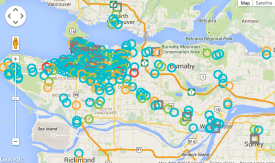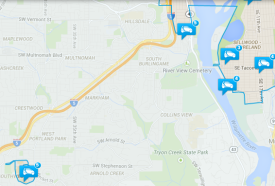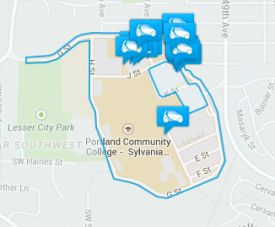You’ve probably heard that Seattle’s about to launch into a heated contest—one that pits city against city vying for honor, bragging rights, and civic pride.
We refer, of course, to the Car-Sharing Super Bowl!
OK, maybe that’s a bit of a stretch. Still, on just about every playing field there’s a hint of healthy competition among the Pacific Northwest’s three biggest cities—Seattle, Vancouver, and Portland. Car-sharing should be no exception: cities ought to be vying to see which one offers the best car-sharing services. And with these services expanding rapidly throughout the Pacific Northwest (and beyond), we thought it would make sense to see how the Cascadia’s Big 3 stack up.
As it turns out, the contest wasn’t as close as we thought it would be: Vancouver, BC wins the Northwest Car-Sharing Super Bowl hands down. Let’s go to the highlights:
Pregame show
It’s easy to see why car-sharing is catching on: it’s simple, it’s convenient, and it gives people an inexpensive way to get around. In the Pacific Northwest, car-sharing is expanding, with a growing list of companies operating thousands of vehicles for tens of thousands of people. The convenience of car-sharing has made it possible for some northwesterners to drop a privately owned vehicle, saving them thousands of dollars per year. And it’s not a stretch to say that car-sharing is helping to alter the region’s transportation system and the form of our cities.
The Players
Cascadia’s car-sharing market consists of five companies: Modo The Car Coop, Zipcar, Car2Go, Getaround, and RelayRides. All of these companies have expanded over the last few years, and several have innovated in their business models and the kinds of vehicles they offer. Each company offers one of three basic car-sharing models:
- Two-way: Zipcar and Modo The Car Coop have fixed, specified “homes” for each car. Cars must be returned to the same place where they were first picked up.
- One-way: Car2Go allows users to take a one-way trip in a rented care, as long as the car is parked anywhere in the “home area,” usually a fairly broad urban region. This can allow a renter to drive to a place and return home by some other means, such as transit, walking, or catching a ride with a friend.
- Peer-to-peer: With Getaround and RelayRides, cars are owned by private individuals, while the car-sharing company simply provides an online platform to allow people to rent out their cars to their neighbors.
Each car-sharing model offers unique advantages, and they complement one another well. Unfortunately, it’s not always easy to figure out how many shared vehicles are out there, as the companies often decline to give out specific numbers. So we took a look at a variety of sources, including hand-counts in the dead of night, to estimate how many shared vehicles of each type are available in each city.
Here’s how the three cities stack up.
The First Quarter: Two-Way Car Rentals
 Zipcar has a healthy presence in Seattle, Vancouver, and Portland, with more than a hundred in each city. But the presence of Modo gives Metro Vancouver the lead in this category.
Zipcar has a healthy presence in Seattle, Vancouver, and Portland, with more than a hundred in each city. But the presence of Modo gives Metro Vancouver the lead in this category.
Note the lines of cars stretching out from Vancouver: these correspond to transit lines/stations. We’ll say more on this later.
Result: Touchdown Vancouver; one field goal each for Seattle and Portland.
The Second Quarter: One-Way Car Rentals
 Car2Go is the only company running one-way rentals in these three cities at the moment, though Zipcar and Drivenow (BMW) may get into this market in the near future. Car2Go notably has about 500 vehicles in Seattle and Portland but 700 in Vancouver.
Car2Go is the only company running one-way rentals in these three cities at the moment, though Zipcar and Drivenow (BMW) may get into this market in the near future. Car2Go notably has about 500 vehicles in Seattle and Portland but 700 in Vancouver.
 Car2Go is doing some interesting things in all three cities. First of all, they’re not only expanding the size of their fleet, but also adding to the “home area” in which users can legally park a Car2Go car and cease their rental. They’ve even added a few “islands” outside the main home area, most of which appear to be colleges. (For example, in the pictures to the right note the Car2Go “island” around Portland Community College.)
Car2Go is doing some interesting things in all three cities. First of all, they’re not only expanding the size of their fleet, but also adding to the “home area” in which users can legally park a Car2Go car and cease their rental. They’ve even added a few “islands” outside the main home area, most of which appear to be colleges. (For example, in the pictures to the right note the Car2Go “island” around Portland Community College.)
Instant Replay: Car2go has started deploying electric cars in both Portland and Vancouver, but not Seattle yet. Even Indianapolis is getting on the electric car-sharing…um…wagon. Why not Seattle? This will be the subject of future coverage here at the Sightline Sports Network!
Result: Touchdown Vancouver; field goals for Portland and Seattle.
The Third Quarter: Peer-to-Peer
Getaround and RelayRides are rapidly growing “peer-to-peer” car-sharing services. Unlike the other services we described above, users are renting a vehicle that’s owned by another private individual, not by the companies themselves. Getaround and RelayRides act more like brokers than car-sharing providers. This creates certain advantages: the ability of anyone to list any vehicle allows for greater variety of vehicle types, prices, and locations. This variety cuts both ways, since more choices also can create a more varied experience each time one rents a different vehicle.
To date, Relayrides is in Seattle and Portland while Getaround is available in Portland but not in Washington State. Neither company operates in British Columbia.
Result: Touchdown for Portland, a field goal for Seattle—and Vancouver fumbles!
Fourth Quarter: Innovation
Beyond just looking at the numbers, we looked at how each city is using car-sharing in innovative ways. And on innovation, Vancouver is far ahead of the pack.
Many Metro Vancouver cities are using car-sharing to replace government fleet vehicles. Government departments are also using car-sharing technology to share their own fleet vehicles between departments, allowing for additional cost savings.
Vancouver is also substituting car-sharing for parking requirements, with one car-sharing vehicle replacing 5 required parking stalls. The vehicles are free for anyone to use, but obviously are highly convenient to building inhabitants.
This approach is a novel and much-needed reform to Vancouver’s parking policy. As UCLA Professor Donald Shoup has extensively documented, parking requirements drive up the cost of development and a de facto subsidy to driving—boosting negative impacts such as congestion, pollution, and health problems.
One car-share vehicle replacing five parking stalls could mean cheaper housing. After all, parking stalls don’t come cheap, costing as much as $30,000 for a single structured stall. Getting rid of parking requirements reduces the minimum rent that a developer must charge in order to break even. It also likely results in less traffic congestion since even if that vehicle is extensively used, it can only take up one space on the road at any given time, whereas five independent cars can in theory all be on the road at once.
On integrating car-sharing into municipal policy, Seattle is behind the curve. Seattle recently expanded carsharing to allow 4 companies to each have up to 750 “free floating” vehicles within the city limits for a total of 3000. While no city is close to reaching 3000 yet, Car2Go in Portland is at 700, meaning that Seattle’s new “ceiling” is close to Portland’s “floor.” But to our knowledge (and correct us if we’re wrong!), neither city has instituted a program to allow car-sharing in lieu of parking requirements. Nor have they substituted car-sharing for government vehicles.
On the whole, Vancouver is far ahead when it comes to integrating car-sharing into the function of the city and this lead will only compound with time unless Seattle and Portland find a way to catch up.
Result: Touchdown Vancouver; fumbles by Seattle and Portland.
Final score: Vancouver 21, Portland 13, Seattle 9
In the real Super Bowl, Seattle has a decent shot of winning the whole thing. But in the Northwest’s Car-Sharing Super Bowl, Seattle lags behind in third place, and it’s Vancouver who captures the Car-Sharing Lombardi Trophy.
Luckily, the real winners in the car-sharing competition are the residents of the three cities. And when cities compete to see which can offer the best car-sharing options and policies, there are no losers.
The Stats
- Vancouver: Nearly 1,200 total car-sharing vehicles; electric vehicles; strong policy integration and innovation; no peer-to-peer system (yet).
- Portland: Roughly 960 total vehicles; electric vehicles; competing peer-to-peer systems; weak policy integration.
- Seattle: More than 750 total vehicles; no electric vehicles; one peer-to-peer system; weak policy integration.










Dave Danielson
Cute football format. I always wonder “what if all the millions – nay, billions – of dollars that go into football were instead devoted to bettering communities?”
Clark Williams-Derry
Very good point. And just FYI, the market value of just one football team may exceed $3 billion, and the league as a whole is worth tens of billions. http://www.forbes.com/nfl-valuations/
Marie Walkiewicz
Leaving the football analogy behind, what about a per-capita comparison? If we compared level of service to number of potential users, who wins then?
Clark Williams-Derry
VERY good question. We decided to sidestep it a bit, because the boundaries aren’t really clear. In all 3 cities, car-sharing is concentrated in the downtowns and dense, inner-ring urban and suburban neighborhoods. But that leads to a question – for the population divisor, do we include just the urban core, or the core plus some suburbs, or the entire metro area? And if we do include suburbs or smaller municipalities, which ones?
But in case it matters, here are some population figures:
Vancouver: 603,000 city, 2.5 million metro area
Portland: 583,776, 2.3 million metro area
Seattle: 640,500 city, 3.6 million metro area
Based on that, Seattle falls further behind — it’s got the smallest car-sharing presence and the largest population. I think that Vancouver still edges out Portland on a per capita basis, even though it’s a bit larger.
More importantly, these rankings are offered in a spirit of fun — they’re not designed to be the definitive last word. So if someone else comes up with a better ranking system that takes population differences into account, I’m all ears!
Ryan Mottau
I think you are selling Portland short, not only did we have a homegrown service (before any of the others) in FlexCar (later acquired by zipcar), but many public and private entities,including our planning and design firm, have been using car sharing as an incentive for employees to explore alternative commuting. I know that the Portland development (PDC) opted for car sharing over a city-backed fleet years ago. OHSU as well.
Steve Dotterrer
Portland’s zoning code does allow for substitution of car sharing spaces in all zones and for all uses. And of course residential uses within 1500 feet of transit have no required parking (for less than 30 units) or greatly reduced requirements as the development grows.
Here is the text related to car sharing parking:
For every car-sharing parking space that is provided, the motor vehicle
parking requirement is reduced by two spaces, up to a maximum of 25
percent of the required parking spaces;
b. The car-sharing parking spaces must be shown on the building plans;
The code also requires a copy of the agreement between the car sharing company and the building owner.
Some variation on this code language has been in place for more than a decade since I know of a building in my neighborhood that used the provision before 2000.
Alan Durning
In a recent news article, I saw it reported that the number of Car2Go members in Seattle is between 60,000 and 70,000. That’s more than 10 percent of licensed drivers in the city. I wonder what the comparable figures are for Portland and Vancouver, BC.